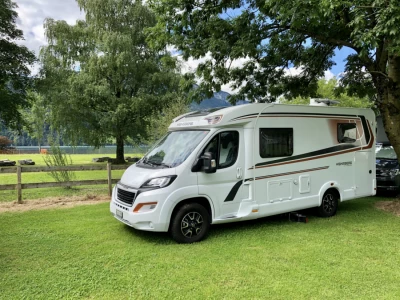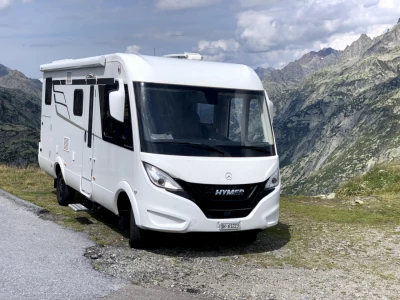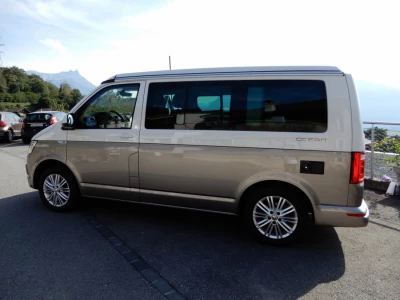Terms and expressions in the motorhome, caravan and camping world
, Nov 14, 2022, Reading time: 9 min
Reading time: 9 min
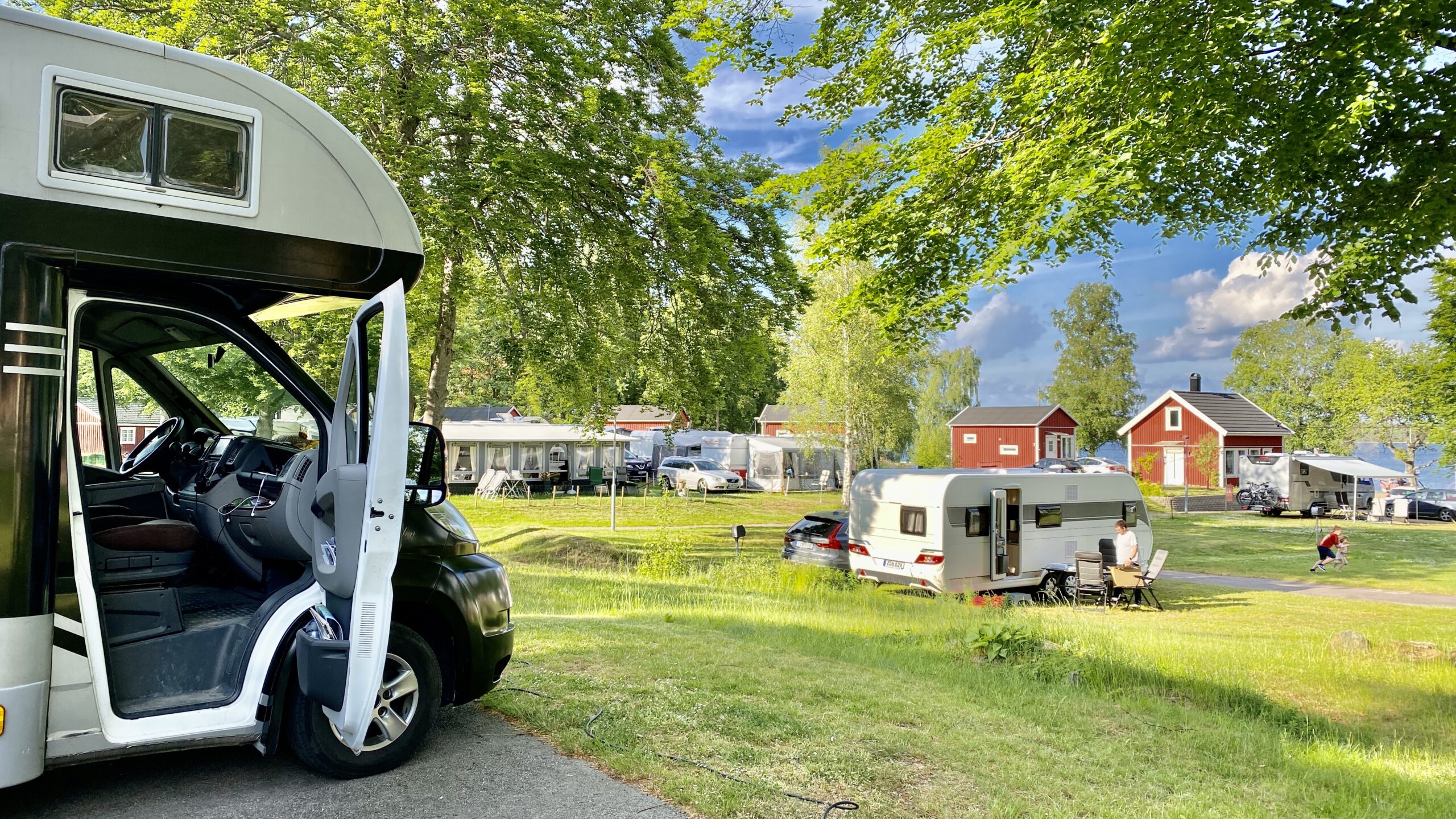
• • •
There is a wide range of terms and expressions in the world of motorhomes, caravans and camping world. If you are new to world of camping, there are many words to familiarise yourself with, but even if you have been around for a while can you now and then come across new expressions. In this list, you will also find terms that are specific to renting and renting out vehicles via MyCamper.
Types of motorhomes and caravans
- Alcove motorhome: A motorhome that has a superstructure (alcove) above the driver’s cab. The alcove is usually furnished as a sleeping area.
- Camper: A construction that is furnished for camping, and can be attached to the bed of a pickup truck or similar vehicle. Note that “camper” in english, especially in Europe, can refer to all types of motorhomes and camper vans.
- Campervan: A simpler camping vehicle that may lack some of the equipment that usually is in a motorhome, such as a toilet. Can also refer to a home-converted van that has been equipped to be used as a camper van.
- Entry-level model: Motorhomes and caravans that are adapted for first-time buyers. These vehicles often have simpler equipment and lower price.
- Fully integrated: A motorhome model where the entire vehicle, both living area and chassis, is built by the motorhome manufacturer.
- Semi-integrated/partially integrated: The most common type of motorhome in the Nordics. For this model the living area is manufactured separately and combined with a truck chassis that has original cab. However, the cab kan often be adapted, for example through rotatable seats.

The motorhome/caravan
- A-measurement: Used to find the right awning for the caravan. The measurement is taken from the ground through the entire awning rail and down to the ground again.
- Ball weight: The part of the caravan’s weight with which the caravan vertically loads the towbar of the towing vehicle.
- Black water/latrine: Sewage from the toilet.
- Chassis: The frame/structure of the vehicle. Many European motorhomes have Fiat chassis.
- Curb weight: The theoretical weight of the vehicle in ready-to-drive condition, including the driver and some basic things such as fuel.
- Garage: Larger storage space in the motorhome or caravan that is accessed via a hatch from the outside. Here you can for example store outdoor furniture, cables, level blocks etc.
- Greywater/wastewater: Drainage from kitchen sink, and shower and sink in bathroom.
- Living area: The part of the motorhome where you live, as opposed to the part where you sit when driving (the driver’s cab).
- Load weight: The difference between the total weight and the curb weight of the vehicle, which tells you how much you can pack.
- Long beds: Single beds that are placed along the walls in the direction of travel of the vehicle.
- Overhang: The part of the motorhome that protrudes rearward, after the center of the rear axle.
- Step: A step that can be folded out, so that it is easier to step into the caravan’s or motorhome’s living area.
- Total weight: The maximum total weight the vehicle is allowed to have with a full load including passengers.
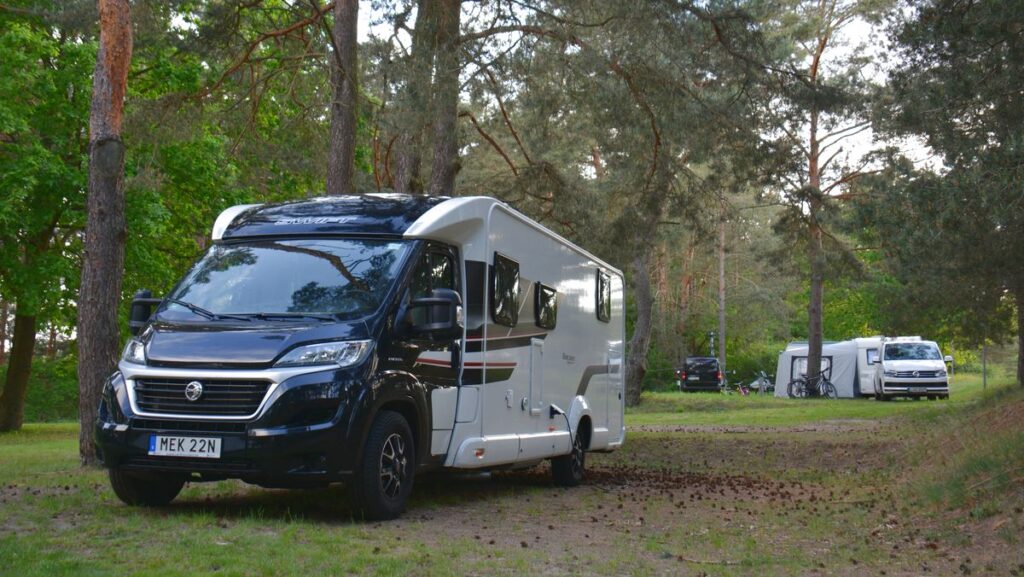
Rent the perfect camping vehicle for you and start your own camping trip.
Rent a motorhomeRent a campervanRent a caravanEquipment in motorhome/caravan
- Awning: A tent that is mounted next to the caravan or motorhome and forms an outdoor room.
- Control panel: A panel in the motorhome/caravan where you get an overview of various systems in the vehicle, such as electricity consumption and water level.
- Gasol, LPG: The gas that is usually used in motorhomes and caravans, for heating and cooking amongst other things. In the Nordic region the gas mainly used is propane. In some countries in southern Europe, the gas may contain a mixture of propane and butane.
- Generator: A portable generator that produces electricity and runs on gasoline.
- Insulating mat: An insulating blanket that you attach to the outside of the front of the motorhome, to keep the heat inside the car.
- Inverter/voltage converter: Used to convert 12 volts to 220 w, for example to be able to charge a computer when the motorhome/caravan is not connected to electricity.
- Leveling blocks: Blocks that you can drive up the wheels on, to make the camping vehicle stand straight.
- Melamine: A hard plastic material that is often used for plates, bowls and crockery intended for motorhomes and caravans.
- Omnia: A kind of “mini-oven” that you place on top of the stove.
- Toilet cassette: Container for black water (drainage from the toilet).

On the journey
- Off road notification: When you are not driving the motorhome, you can make an off road notification at the Swedish Transport Agency. Depending on which insurance you have, this can affect how high the insurance premium you pay when your vehicle is in use and under off road notification.
- Toll road: A road where you have to pay a toll to drive. There are toll roads, for example, in Norway, France, Spain, Portugal, Austria and Switzerland. The toll fee is paid in different ways, for example at toll booths or by paying in advance and affixing a vignette to the windshield.
- Bompengar (toll fees): Fee on many roads, bridges and tunnels in Norway. The toll booths are automatic and you can’t pay on the spot. The easiest way is to register the vehicle at www.autopass.no before departure.
- Camping Key Europe: A benefit card that gives discounts on campsites in Europe. The card is available as an app now.
- Camping plot: The surface of a camping site the guest may use for their camping vehicle or tent, as well as other equipment.
- Euro6: Environmental class that must be met by all new passenger cars and light transport vehicles sold in Sweden. Environmental zones can exclude vehicles that do not meet the requirements of the environmental class.
- Wild camping: When you spend the night in a place that is not specially designated as a campsite or stopover site. Read more about wild camping here.
- Green card: Proof that your vehicle is insured and to what extent the insurance applies. The card is to be ordered from the insurance company and may be needed when you travel abroad, especially outside the EU.
- Motorhome campsite: A campsite or stop site that only welcomes motorhomes.
- International Camping Card: A camping card which gives discounts on campsites in Europe and which can be used as an identity document at the campsites.
- Long-term campers/seasonal campers: Campers who book a place at the same campsite for an entire season.
- Rest area: A place to stop and rest along a road. At some rest areas there are services in the form of toilets, garbage disposal and possibility for emptying black water. Sometimes you can stay overnight at a rest area, but both rules and safety can differ between countries and areas.
- Stopover sites: Place where you can spend the night with a motorhome (and sometimes with a caravan), which is usually simpler and cheaper than a campsite. Stop sites can be completely without services, or have services in the form of, for example, electricity, water, toilets, garbage disposal and emptying of black water. In collaboration with Acamp, we now offer a discount on the best stop sites in Sweden, read more here. Check out our articles about motorhome stopovers.
- Transponder: An electronic payment system required to drive heavier motorhomes in some countries. The system works differently in different countries.
- Emptying station: A place where you can empty gray and/or black water. This could be, for example, rest areas, campsites or harbours. Find out how you can find emptying stations here.
- Vignette: A sticker that you get in some countries when you have paid a motorway toll. The sticker must be attached to the windshield.
- Winter storage: Indoor or outdoor storage during the winter, if the motorhome or caravan is not being used. You can read more about winter storage here.
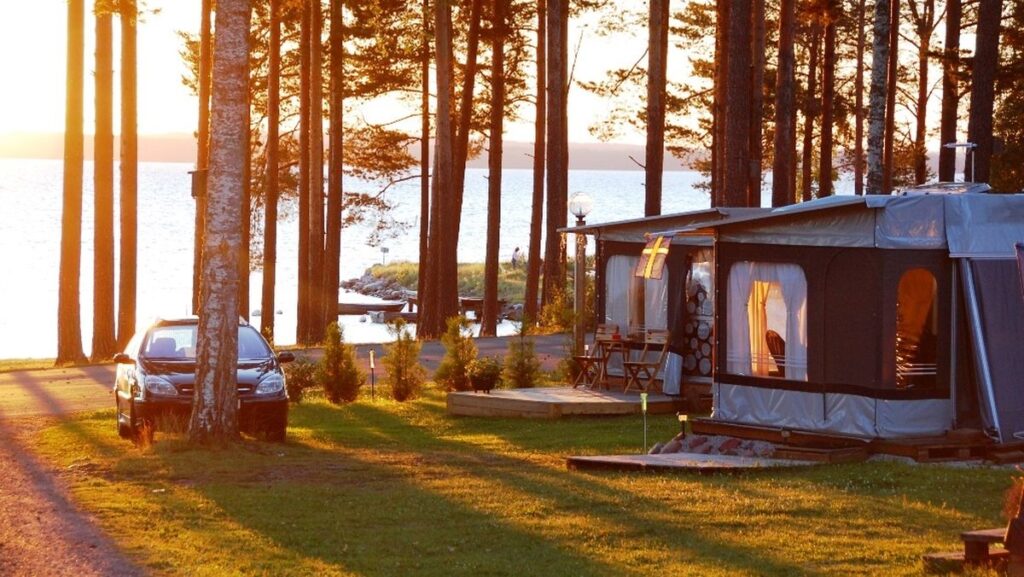
Rent the perfect camping vehicle for you and start your own camping trip.
Rent a motorhomeRent a campervanRent a caravanMyCamper specific terms
- Booking request: Request to rent a camping vehicle. Sending a request is always free of charge. After the confirmation of the vehicle owner, the booking is confirmed.
- Instant booking: Camping vehicles with instant booking can be booked directly.
- Deposit: Amount that the renter pays as a “pawn”. The fee is paid to MyCamper (unless otherwise agreed) so that the renter can feel secure when paying. The deposit is returned after returning the vehicle.
- Free kilometers: The number of kilometers included in the rental price. The owner fills in a number of free kilometers that are included and what it costs if these are exceeded.
- Extra kilometers: If the amount of free kilometers is exceeded the amount per extra kilometer will be charged.
- High season: At MyCamper the high season is June – August.
- Low season: At MyCamper the low season is September – May.
- Service fee: MyCamper fee for a completed booking.
- Deductible: The expense that the renter themselves bears in the event of a damage per claim. The deductible for a specific vehicle is stated in the vehicle profile.
- Deductible reduction: Possibility for the renter to reduce the deductible. The deductible can be reduced during the booking process or afterwards before the booking starts.
- Cleaning fee: Fee charged by the owner for cleaning. The owner indicates the possible fee in the vehicle profile.
- Rule: The owner states the rules which come along when renting the camping vehicle. Rules include if smoking, pets, festivals, children are allowed and what the minimum age is.
- Review: Review provided by renters and owners. The review can include 1 to 5 stars and a comment.
- Insurance coverage: In Sweden, Norway, Finland and Denmark our insurance partner is Omocom. In Switzerland MyCamper has a partnership with Baloise. The tailor-made insurances adapted specifically for the rental of camping vehicles for private individuals. Read more about MyCamper’s insurances here.
- Road assistance: Insurance for roadside assistance. Whether a vehicle is covered by roadside assistance is stated in the vehicle profile.
If you have questions about renting out and renting at MyCamper, you can read frequently asked questions & answers for owners and frequently asked questions & answers for renters.



